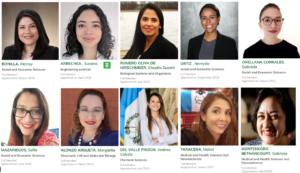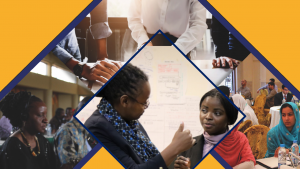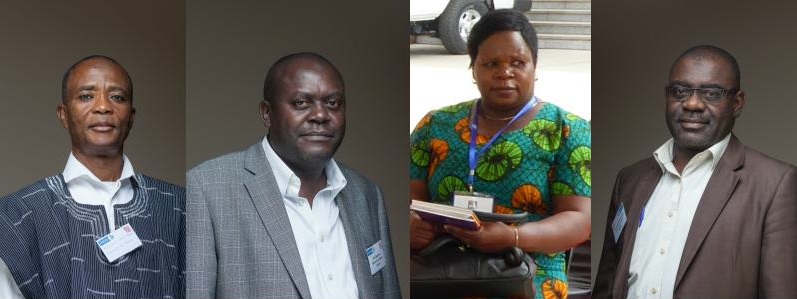
Promoting the use of evidence in parliaments
Photo: Participants in the Parliament Learning Exchange (Left to right) – Mohammed Hardi Nyagsi, Parliament of Ghana; John Mugabi Bagonza, Parliament of Uganda, Christina Mafoko, Director of Research, Parliament of Zimbabwe; Abrahan Ibn Zackaria, Parliament of Ghana.
———————————————————————————————————
– Blog by Agnes A.S. Titriku, Program Manager, African Centre for Parliamentary Affairs (ACEPA), Ghana
Staff members from three parliaments (Ghana, Uganda and Zimbabwe) are participating in a Learning Exchange programme coordinated by the African Centre for Parliamentary Affairs (ACEPA), as part of the VakaYiko project. The aim is to strengthen the role of parliamentary information support units in evidence uptake by providing a space for peer exchange and support—both ‘learning together’ and ‘learning from each other’.
What do the parliaments’ information support systems look like?
“Mapping out linkages and collaboration among information departments has provided insight on how to strengthen weak links for instance through learning from other parliaments”. – Research Officer, Parliament of Ghana
At our first meeting in Kampala in November, participants from Ghana, Uganda and Zimbabwe learned about each of the parliaments’ information support systems. Thirteen staff from information-producing departments – Research, Library, Information Communication Technology (ICT), Parliamentary Budget Office – joined the meeting.
In all three parliaments, the research departments are the main engines that drive the gathering and synthesis of evidence for decision makers. These vary in size and strength across the learning exchange partners, however: Parliament of Uganda has 34 research staff, Zimbabwe 8 and Ghana 10.
Departments such as Library and ICT play an important complementary role. The involvement of these and others such as Hansard, Committees, and Public Affairs in the use of evidence varies across the three parliaments.
Participants also gained insight into the role of specialized evidence units such as Parliamentary Budget Offices, which provide technical analysis on the annual national budget to guide MPs in the scrutiny of the Budget Bill. Uganda is the only Learning Exchange parliament which currently has a Budget Office; Zimbabwe and Ghana are moving towards establishing them, so were interested to hear the experience of Uganda’s Budget Office representative at the meeting.
The working relationship between these information support units is a crucial starting point when supporting evidence use in parliaments. We decided to focus the Learning Exchange on the strongest and most crucial working relationships (between ICT, Research and Library).
Opportunities for improving evidence use in parliaments
The Learning Exchange builds on the first three years of the VakaYiko programme by providing opportunities to collaboratively tackle some of the organizational-level issues that affect evidence use in parliaments. Participants selected several key areas to work on together.
“Not all 275 MPs use products of the research department. Some do not know much about what the department does”. – Research Officer, Parliament of Ghana
The visibility of research departments and the services they offer is important role for stimulating demand for evidence from MPs. Last year we brought research staff from the Zimbabwean and Ghanaian parliaments to observe the Ugandan Parliament’s Research Week, hosted by the Department of Research Services (DRS) under the VakaYiko programme. Parliament of Ghana is now planning to hold a similar event as part of the orientation programmes for its new parliament.
Establishing links with partners from academia, civil society and other institutions in local research systems can boost parliaments’ research capabilities across the many sectors they need to gather evidence on. Participants shared their experience of approaches they are taking to strengthen these links, including through roundtables and exhibits at events. We also heard from a guest speaker from the African Centre for Technology Studies in Kenya, which held a successful series of roundtables with MPs to strengthen the evidence base for climate change legislation.
Another common issue faced by all the information support units is negotiating the intensely political environment within parliaments, as well as the power relationships between parliaments and the executive. Gathering, synthesising and communicating evidence within this challenging context was the topic of a recent videoconference between staff from the 3 parliaments. We used this opportunity to discuss some of the more strategic communications issues faced by parliamentary evidence providers, including how to strengthen feedback mechanisms to build a better understanding of MPs’ evidence needs.
Looking ahead: what next?
Participants are currently using a DGroup – Development through Dialogue – online platform to share experience and examples of their work, such as policy briefs and other evidence products.
Our final face-to-face meeting is taking place in Accra next month. This will include discussions of methods to strengthen mechanisms for gathering citizens evidence, in which Ghana will share their Community Scorecard approach, as well as expanding access to online sources of evidence, in which Uganda will share their experience as a member of their national library consortium.
The next six weeks promise to be an interesting learning experience for parliamentary staff and ACEPA is excited to be part of the process. It is our hope that at the end of this programme, staff from the three parliaments would have learnt from each other, enabling them to promote and increase the use of evidence to inform policy making in their respective parliaments. We’ll be writing up what we’ve learned about evidence in parliaments into a series of papers to be released later this year – stay tuned!
- Sign up to INASP’s newsletter to find out when the papers on the Parliamentary Learning Exchange are ready.
Author biography
Agnes Titriku is the Program Manager for the African Centre for Parliamentary Affairs (ACEPA), where she plays an active role in the design and implementation of programs and interventions for Parliaments within and without the African continent. She also coordinates the activities of the West African Association of Public Accounts Committees (WAAPAC), whose secretariat is currently hosted by ACEPA. She has eight years’ experience of active engagement in the field of Parliamentary Democracy and Governance. Prior to working at ACEPA, she has worked with the Canadian Parliamentary Centre, where she provided research and programmatic support to a number of parliamentary strengthening projects that were being implemented by the Centre.


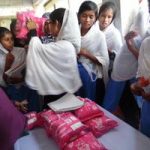 Previous Post
Previous Post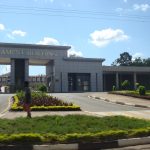 Next Post
Next Post